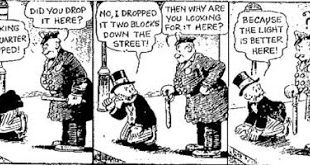AbstractIn the early 1730s George Berkeley began to explore the conceptual field between ideas and spirits that he previously claimed to be empty. In this field he found a rich set of concepts including “notions,” “principles,” “beliefs,” “opinions,” and even “prejudices.” Elsewhere I have referred to this phase in Berkeley’s thought as his “second conceptual revolution.”2 I believe that it was motivated by his increasing need to develop a language to discuss the social, moral and...
Read More »Merijn Knibbe — Thomas Sargent discovered his inner Marxist. Really. Two graphs.
The ‘Matching functions’ mentioined in the quote explain unemployment by assuming that finding a job or a worker takes time. And this does explain unemployment – part of it (2%-point?). The rest must be explained by crises and the inability of the market system to create jobs. As is clear from comparing graph 2, short-lived crises cause lower levels of job creation and higher levels of job destruction. Basically, these swings are not even that large. But together they lead to a fast...
Read More »William McColloch — On Sraffa and the History of Economic Thought
What should the purpose of studying the history of economic thought be? Piero Sraffa explains it.The post is short and important in the study of history of thought, not only economic thought.Sraffa's answer is consistent with Randall Collins, The Sociology of Philosophies: A Global Theory of Intellectual Change.Naked KeynesianismOn Sraffa and the History of Economic ThoughtOpening comments, "Roundtable on Sraffian Economics as Part of the Radical Political Economics Tradition," URPE 50th...
Read More »Branko Milanovic — 1½ Adam Smiths
The recent book by Jesse Norman simply entitled “Adam Smith” is a pleasure to read. There are of course innumerable books on the founder of the political economy, so why another one? Norman’s book is directed toward that, at times elusive, general educated reader, and has, in my opinion, three objectives: (i) to situate Adam Smith in his time, both intellectually and politically, (ii) to argue that there is a remarkable consistency between the Adam Smith of the Theory of Moral Sentiments,...
Read More »Peter Taaff — Parasitic capitalism exposed [Book Review]
Mariana Mazzucato’s new book is a detailed exposé of the parasitic character of modern capitalism, drawing on Karl Marx’s theory of the source of value creation. But understanding the law of value is only a first step to providing an alternative to a system that cannot overcome its inevitable tendency for periodic crises and which needs to be overthrown, argues Peter Taaffe. Socialism TodayParasitic capitalism exposed Peter Taaff | general secretary of the Socialist Party of England and...
Read More »Prebisch manuscripts for his classes on economic dynamics
There is a trend in the history of economic thought field to depend more on archival research. It is certainly nothing new, since some of the best research in the history of ideas, e.g. Sraffa's reconstruction of Ricardian theory, was essentially dependent on archives. The publication of Keynes collected papers have also sparked a wealth of interpretations about his theories, not all worth reading. I have done some research in Marriner Eccles archives at the University of Utah.In part,...
Read More »Matias Vernengo — Classical Political Economy and the Evolution of Central Banks
The paper analyzes briefly the changing ideas on the role of money and banks from William Petty to Thomas Tooke, including the works of Adam Smith, David Ricardo, and Karl Marx. It analyzes the role of ideas in shaping the evolution of central bank regulation. Particular importance is given to the Bank of England’s inconvertibility period, from 1797 to 1821, and the ensuing debate in shaping Robert Peel’s Bank Act of 1844, which is often seen as the birth of modern central banking. The...
Read More »Jim O’Reilly — Some thoughts on liberal democracy as a deceptive term
Reflections with which I agree.Comments on Global Political EconomySome thoughts on liberal democracy as a deceptive term Jim O'ReillySee alsoIn my view, Dugin gets this right, too, as opposed to bourgeois liberalism's, "My way, or the highway." The third totalitarianism is transnational corporate totalitarianism under the control of international capital, which happens to be mostly in Western "liberal" hands.Geopolitika The 'Third Totalitarianism' From The West Alexander Dugin
Read More »Charles Goodhart and Michael Hudson — Some ways to introduce a modern debt Jubilee
The increasing income and wealth inequalities within countries is one of today’s great social concerns. This column describes how the tendency towards increasing indebtedness in much earlier societies was held in check by debt-cancellation Jubilees, and discusses ways to deal with today’s debt overhang and accompanying wealth inequalities. The funding of a modern Jubilee could come mostly, perhaps entirely, from a land/or property tax. Vox.euSome ways to introduce a modern debt Jubilee...
Read More »Michael Emmett Brady — J M Keynes on the Enemies of Capitalism: The Internal, Endogenous Threat to the Macro Economy from Wall Street Stock Market Speculators and Rentiers
Abstract J M Keynes carefully read Adam Smith’s The Wealth of Nations (1776) before he was 28. Of extreme importance to Keynes was Smith’s categorization of a group of upper income class citizens, whose speculative and financial interactions with the private banking industry created a very severe danger to the society as a whole, as being projectors, imprudent risk takers, and prodigals. Keynes’s description of Smith’s projectors, imprudent risk takers, and prodigals in the General Theory,...
Read More » Heterodox
Heterodox

